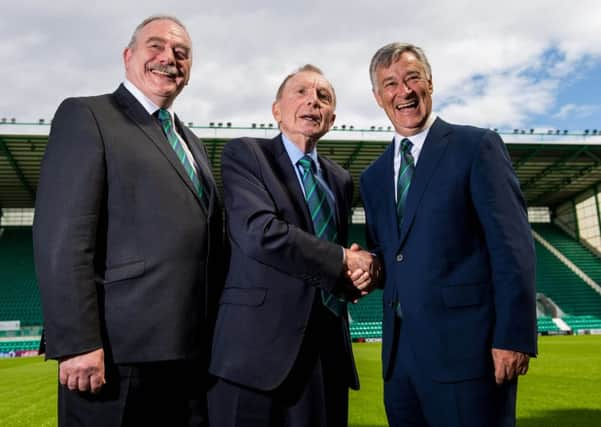Hibs’ Sir Tom Farmer reveals Scottish Cup delight and numerous suitors he turned away


As his ownership of the institution he rescued from oblivion – exactly 28 years ago today – came to an end, Farmer admitted winning the Scottish Cup was, perhaps unsurprisingly, the greatest moment of that lengthy reign.
That victory in 2016 was the first time the trophy had been paraded through Leith in 114 years, the last time being when his grandfather and his brother had got their hands on it.
Advertisement
Hide AdAdvertisement
Hide AdHe said: “They met up with a horse-drawn carriage and took it along Princes Street, down Leith Walk to the Duke’s Head in Duke Street and they had a celebration there. He then took it home and my dad told me it was on the sideboard in pride of place that night.
“I wanted to be involved in wining the Scottish Cup, I might still be hanging on if it hadn’t happened.”
There was, naturally, a celebration when Alan Stubbs and his team brought it back to Easter Road following that epic 3-2 victory over Rangers, but at the end of the night there was a surprise for Farmer as chairman Rod Petrie handed him a box as he left for home.
He said: “I was leaving with my grandson Adam when Rod said, ‘we’ve got something for you to take home.’ I thought it was a present and wondered what it was. I opened it up and it was the Scottish Cup.”
Advertisement
Hide AdAdvertisement
Hide AdAlthough owner for almost three decades, Kwik-Fit founder Farmer readily admits he had no interest in football when he was initially approached for help in saving a club which was “bust”.
He said: “It was a gradual thing, getting as obsessed with football as I am with tyres. It didn’t happen overnight. I never came to the football when I was a boy or a young man, I worked every Saturday from the age of 14, so I never managed to create that interest in football.
“When I became involved, the club had nothing. They had supporters and a board who were obsessed in putting things right. Now I see a stadium that’s the envy of so many clubs, a state of the art training ground offering every facility for the community.”
“When people ask me what the good tings have been, what I enjoyed the most, it was when a mother would stop me in the street and say, ‘thanks very much for all you’ve done for Hibs’.
Advertisement
Hide AdAdvertisement
Hide Ad“When I asked why, she said: ‘Because it’s made such a difference to my children’. To have that public recognition, to play a role in keeping the club going, that gave me a lot of satisfaction.”
Throughout the years, Farmer never made any secret of the fact that he’d be willing to sell the club – but only the right buyer who he feels he has now found in American multi-millionaire Ronald Gordon.
He said: “There were loads of people who approached me and approached Rod. But we always applied three criteria, it had to be the right person with the right plans – and the right finance to carry the plans forward. This is the first time we’ve met somebody who ticked all three boxes.
“A lot of people were enthusiastic, telling us: ‘Oh, we want to own a football club’. We would say: ‘Fine, tell us what you’re going to do with it’. Then it hit the wall.
Advertisement
Hide AdAdvertisement
Hide Ad“Have you got deep pockets? And the answer was no. A lot of enthusiastic people got carried away – and that would be no use. We have to be very careful over who we pass it on to because I would hate to think that all the hard work Rod has put in, along with the other various directors, the work I have done, would be wasted. I would hate to think that, six months after this, Hibs are back in the position we were in when I took over. The reason the club was a failure was it wasn’t managed properly. People didn’t realise it wasn’t a cash cow, that it needed investment.”